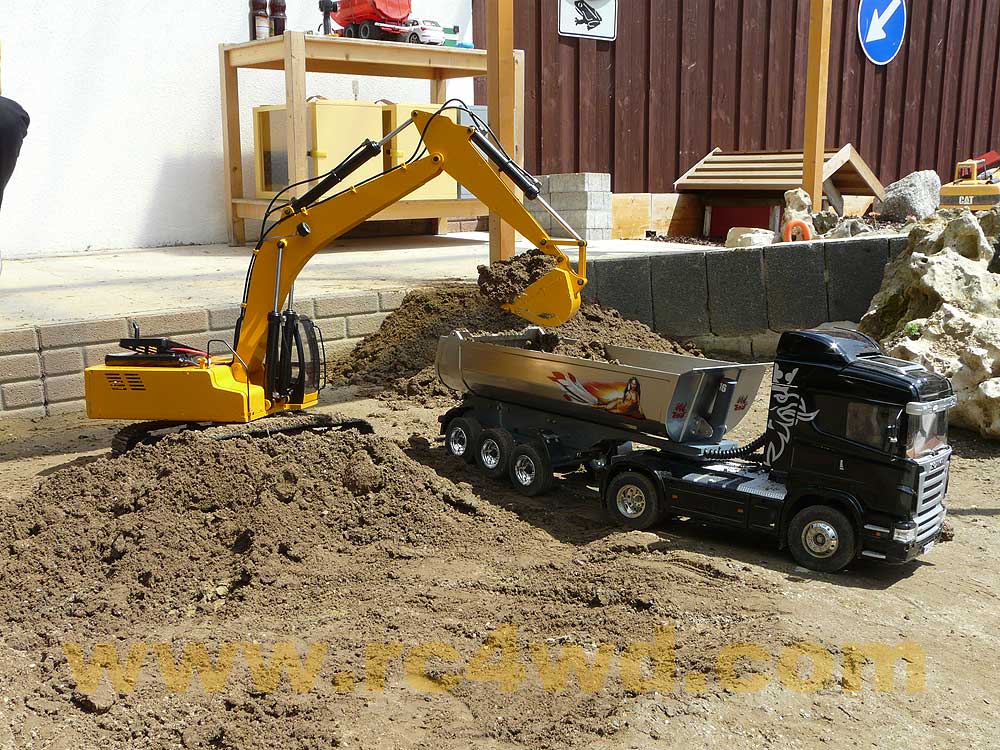Understanding the Role of a rc excavator in Large-Scale Construction Projects
Discover the Significance of Excavator in Modern Building And Construction Projects
Excavators are vital tools in modern building tasks. Their convenience allows them to carry out a large range of jobs, from digging and grading to demolition and website prep work. Advanced attributes, such as hydraulic add-ons and GPS, boost their capabilities and effectiveness on work sites. As the industry advances, the significance of excavators grows a lot more. Understanding their role can disclose insights into the future of construction techniques. What lies ahead for these devices?
The Adaptability of Excavators in Numerous Projects
Excavators are commonly connected with large building and construction jobs, their versatility allows them to be utilized in a broad array of applications, from residential landscaping to utility maintenance. In metropolitan settings, excavators can navigate tight spaces to dig foundations for homes or mount water drainage systems. Their capacity to carry out fragile tasks makes them suitable for landscape design jobs, where they can excavate for ponds or plant trees. Additionally, excavators play a necessary role in utility upkeep, successfully digging trenches for pipes or cords without interrupting bordering areas. In farming applications, they help in land cleaning and soil preparation. Additionally, their adaptability enables them to be outfitted with numerous accessories, enhancing their capability across different tasks. This multifaceted nature of excavators not only simplifies various building procedures however additionally shows their important role in modern framework advancement and maintenance.
Key Functions and Kinds Of Excavators
The conversation on key attributes and types of excavators highlights the important features that make these devices invaluable in construction. Numerous excavator types, each created for particular jobs, demonstrate their versatility and performance across various applications. rc excavator. Comprehending these attributes and categories is crucial for optimizing their usage in modern-day building and construction projects
Excavator Keys In Overview
Excavators play a critical role in modern-day building, providing flexibility and effectiveness throughout various tasks. These hefty equipment systems come in a number of kinds, each customized for details applications. The most typical kinds include spider excavators, understood for their stability on unequal terrain, and wheeled excavators, which supply greater movement on paved surfaces. Small excavators are favored for small projects and tight rooms, while long-reach excavators are developed for deep excavating. In addition, there are specialized excavators, such as hydraulic excavators, which boost power and precision. Each kind includes distinct capacities, making them necessary for tasks ranging from excavating and grading to demolition and product handling. Comprehending these variants allows building experts to pick the right excavator for their task requires.
Key Includes Explained
Comprehending the essential attributes of excavators improves their effective application in construction projects. Excavators are identified by their effective hydraulic systems, which give the needed force for digging, lifting, and relocating materials. Their articulated arms permit for a wide variety of activity, assisting in exact procedures in constrained areas. In addition, the range of accessories, such as pails, grapples, and augers, expands their adaptability to fulfill different job demands. The size and weight of excavators also add to their stability and ability to move on various terrains. Developments in technology have led to the assimilation of General practitioner and automation, improving accuracy and effectiveness in excavation tasks. These attributes collectively place excavators as crucial tools in contemporary building.
Applications in Building and construction
Changing building websites, excavators play a pivotal role across numerous applications, varying from property structure projects to massive framework advancements. These flexible devices are furnished for tasks such as digging structures, trenching for energies, and site grading. Different kinds of excavators, including crawler, rolled, and mini excavators, give details benefits tailored to the job needs. Crawler excavators master rough terrains, while rolled excavators supply movement on paved surfaces. Mini excavators are excellent for confined rooms, making them prominent in city setups. The efficiency and power of excavators considerably quicken building and construction processes, guaranteeing prompt task completion. Their versatility even more improves their value, enabling building teams to take on a varied range of difficulties efficiently.
Enhancing Efficiency and Efficiency on Task Sites
Making best use of efficiency and efficiency on work sites is an essential purpose in modern building. Excavators play a pivotal role in accomplishing this goal by streamlining numerous jobs. Their capability to execute several features-- such as excavating, training, and grading-- decreases the demand for added devices, thereby saving time and resources.Moreover, excavators boost process by enabling faster conclusion of jobs. With sophisticated attributes like hydraulic attachments and GPS innovation, they can execute specific procedures that lessen mistakes and revamp. This accuracy not only enhances the high quality of work yet also optimizes material usage, adding to cost savings.The adaptability of excavators enables them to adapt to different website conditions, making certain that tasks proceed smoothly no matter of obstacles. By incorporating excavators right into construction processes, teams can greatly enhance their total performance, causing prompt project conclusion and increased profitability.
Safety And Security Benefits of Making Use Of Excavators
Excavators significantly improve safety on construction websites through boosted operator exposure and minimized manual work dangers. By offering operators with a clear view of their surroundings, excavators aid to stop injuries and mishaps. Furthermore, the machinery reduces the need for employees to participate in hazardous hands-on jobs, additionally advertising a much safer job environment.
Enhanced Driver Exposure
Although construction sites can be chaotic and full of prospective threats, enhanced driver exposure plays a vital duty in making certain security when utilizing excavators. Modern excavators are developed with huge, unhampered windows and tactically positioned mirrors, enabling drivers to keep a clear view of their surroundings (rc excavator). This boosted exposure is vital for detecting pedestrians, various other equipment, and different obstacles, significantly lowering the risk of mishaps. In addition, many excavators incorporate innovative innovation, such as sensing units and cams, to provide drivers with added point of views, additionally boosting understanding. The capacity to see go to my site even more clearly not only aids in effective operation however also promotes a more secure job environment, making it easier for drivers to navigate intricate building sites without compromising safety and security standards
Decreased Manual Work Threats
When manual labor is decreased with using excavators, many security advantages emerge, considerably boosting the health of construction employees. Excavators minimize the physical strain related to hefty lifting and repetitive jobs, properly decreasing the risk of bone and joint injuries. By automating processes such as digging, grading, and relocating materials, they permit employees to maintain a much safer range from prospective risks. Furthermore, excavators are geared up with advanced safety functions, such as rollover protection systems and improved driver ergonomics, which better secure workers on website. The outcome is a substantial reduction in work environment mishaps and injuries, causing raised productivity and morale amongst building teams. Eventually, the fostering of excavators adds to a much safer and a lot more effective building atmosphere.
Excavators in Earthmoving and Website Preparation
In modern building and construction, a considerable portion of earthmoving and site prep work tasks relies on the efficiency and versatility of excavators. These devices are created to manage various soil kinds and terrain, making them essential for grading, excavating, and trenching activities. Their hydraulic arms can be equipped with different attachments, such as augers and buckets, permitting operators to customize their approach based upon particular task requirements.Excavators succeed at relocating large quantities of earth quickly and effectively, which accelerates the total construction timeline. They can navigate limited spaces and challenging sites where typical tools may have a hard time, boosting efficiency. In addition, the precision of excavators warranties that website prep work sticks to rigorous specs, lessening the risk of errors that can lead to expensive rework.
The Duty of Excavators in Demolition Tasks
Excavators play an essential role in demolition tasks, as they have the power and agility needed to take apart frameworks efficiently. Equipped with different attachments such as hydraulic breakers, shears, and grapples, these makers can adapt to different demolition needs, whether for tiny buildings or large commercial websites. Their adaptability makes it possible for drivers to deal with intricate jobs while preserving security and precision.In addition to their demolition capacities, excavators facilitate debris elimination, guaranteeing that work websites continue to be well organized and risk-free. By breaking down frameworks into convenient items, they enable structured clearing and recycling of products, aligning with modern-day sustainability efforts.Moreover, excavators can access limited rooms and navigate uneven surface, making them important in metropolitan demolition projects. On the whole, their durable layout and multifunctionality make excavators a vital possession in the demolition stage of construction, adding considerably to job timelines and efficiency.


Future Patterns in Excavator Modern Technology and Use
As the building and construction market progresses, developments in excavator modern technology are positioned to transform their usage and efficiency noticeably. One substantial fad is the combination of automation and synthetic intelligence, allowing excavators to run with marginal human treatment. This change will enhance precision in jobs such as grading and trenching, reducing human error and increasing productivity.Additionally, the rise of electrical browse this site and hybrid excavators is shaping an extra lasting building and construction atmosphere, reducing carbon exhausts and fuel expenses. Improved telematics systems are also emerging, enabling real-time tracking of equipment efficiency and maintenance demands, which can lead to better operational effectiveness and longer tools lifespan.Moreover, advancements in add-on technology are expanding the versatility of excavators, permitting them to do a broader variety of tasks. The combination of these fads demonstrates a future where excavators are smarter, greener, and much more versatile, eventually reshaping building and construction job characteristics.
Regularly Asked Inquiries
Just How Do Excavators Compare to Various Other Building And Construction Equipment?
Excavators, identified by their convenience and power, master excavating and earthmoving contrasted to other equipment. Their ability to execute different jobs, including training and demolition, makes them essential in building tasks, improving total effectiveness.

What Is the Typical Lifespan of an Excavator?
The ordinary lifespan of an excavator typically varies from 7,000 to 10,000 operating hours, depending upon upkeep, use problems, and design. Correct care can extend this lifespan, guaranteeing peak performance throughout its functional years.
How Are Excavators Preserved for Ideal Performance?
Excavators call for normal upkeep for peak efficiency, consisting of routine examinations, fluid checks, filter replacements, and timely fixings. Carrying out a preventative maintenance schedule aids extend their life-span and guarantees reliable operation in various building settings.
What Are the Costs Related To Purchasing an excavator vs. leasing?
The costs related to renting out versus acquiring an excavator vary considerably. Leasing deals reduced upfront expenses but can accumulate in time, while buying needs a substantial preliminary financial investment, yet offers lasting savings and possession ownership advantages.
What Training Is Needed to Run an Excavator?
Operating an excavator needs specialized training, commonly consisting of safety and security procedures, maker operation a fantastic read strategies, and ecological awareness. Certification programs commonly mandate sensible experience, making it possible for operators to deal with numerous jobs efficiently while making sure conformity with industry regulations. The most usual kinds consist of spider excavators, understood for their stability on unequal terrain, and rolled excavators, which supply better movement on smooth surface areas. Miniature excavators are favored for limited spaces and small-scale tasks, while long-reach excavators are designed for deep excavating. In addition, there are specialized excavators, such as hydraulic excavators, which enhance power and accuracy. Different types of excavators, including crawler, rolled, and mini excavators, supply specific advantages tailored to the task demands. Spider excavators stand out in harsh terrains, while rolled excavators use flexibility on paved surfaces.